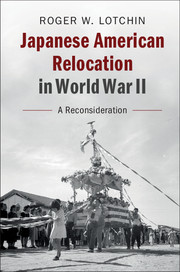Book contents
- Japanese American Relocation in World War II
- Japanese American Relocation in World War II
- Copyright page
- Dedication
- Contents
- Figures
- Preface
- Introduction
- Part I The Reach of American Racism?
- 1 Racism and Anti-Racism1
- 2 The Ballad of Frankie Seto
- 3 The Chinese and European Origins of the West Coast Alien Dilemma
- 4 The Impact of World War II
- 5 The Lagging Backlash
- 6 The Looming Roberts Report
- 7 Races and Racism
- Part II Concentration Camps or Relocation Centers?
- Part III The Demise of Relocation
- Appendix Historians and the Racism and Concentration Center Puzzles: A Compact with Comity by Zane L. Miller
- Bibliography
- Index
2 - The Ballad of Frankie Seto
Winning Despite the Odds
from Part I - The Reach of American Racism?
Published online by Cambridge University Press: 24 April 2018
- Japanese American Relocation in World War II
- Japanese American Relocation in World War II
- Copyright page
- Dedication
- Contents
- Figures
- Preface
- Introduction
- Part I The Reach of American Racism?
- 1 Racism and Anti-Racism1
- 2 The Ballad of Frankie Seto
- 3 The Chinese and European Origins of the West Coast Alien Dilemma
- 4 The Impact of World War II
- 5 The Lagging Backlash
- 6 The Looming Roberts Report
- 7 Races and Racism
- Part II Concentration Camps or Relocation Centers?
- Part III The Demise of Relocation
- Appendix Historians and the Racism and Concentration Center Puzzles: A Compact with Comity by Zane L. Miller
- Bibliography
- Index
Summary
- Type
- Chapter
- Information
- Japanese American Relocation in World War IIA Reconsideration, pp. 24 - 39Publisher: Cambridge University PressPrint publication year: 2018

